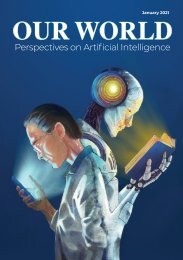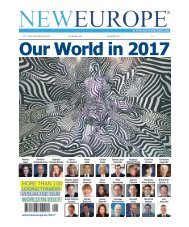Our World in 2018
Leading minds reflect on the state of our societies, and examine the challenges that lie ahead. An edition dedicated to generating ideas that will help form a new vision for our world.
Leading minds reflect on the state of our societies, and examine the challenges that lie ahead. An edition dedicated to generating ideas that will help form a new vision for our world.
Create successful ePaper yourself
Turn your PDF publications into a flip-book with our unique Google optimized e-Paper software.
OUR POLITICAL SOCIETIES
Agile Governance
for a Fractured World
By Klaus Schwab
As the Fourth Industrial Revolution
continues to reshape the global
political economy, many are
grasping for ideas about how to effect
positive systemic change. In a world where
technology is both a disrupter and the
driving force of progress, the best approach
may be to apply lessons from technology to
policymaking itself. Policymakers, like startups,
must look for more ways to iterate
what works and abandon what doesn’t.
To any observer of world affairs, it is
clear that after a relatively long period of
unprecedented peace and prosperity, and
after two decades of increasing integration,
openness, and inclusiveness, the pendulum
is now swinging back toward fragmentation,
.
Indeed, the post-world order has
already fractured in many ways. Ambitious
multilateral trade agreements have fallen
apart after key stakeholders walked away.
Unprecedented global cooperation on
climate change, embodied in the 2015
Paris climate accord, is being undermined.
Separatist movements are becoming more
vocal, as sub-national communities look for
sources of identity that will reestablish a
sense of control. And the president of the
United States has indicated that he will
pursue national self-interest above all else,
and that other national leaders should do
likewise.
These developments follow decades
of globalization, which ushered in an
astonishing period of progress across
many dimensions, from global health and
national incomes to inequality between
countries. But today’s fragmentation is
not about sterile statistics. Rather, it is a
visceral reaction to forces that have driven
Klaus
Schwab
Klaus Schwab
is Founder and
Executive Chairman
of the World
Economic Forum.
a wedge between economics and politics.
In the space between, there is now tension;
but there is also an opportunity to push for
cooperation and shared progress.
The underlying economic drivers of
integration remain powerful. The revolution
in information and communication
technologies (ICT) has drawn people from
around the world closer together; changed
the relationship between individuals
and their communities, employers, and
governments; and set the stage for a new
period of economic and social development
unlike anything that has come before.
And yet the human drive for freedom
– the chance to build a life of meaning
and achievement for oneself and one’s
community – remains undiminished.
At the same time, there has been a
political backlash against the economic
and technological forces of change. Power
has been won by those promising to
protect traditional identities and slow or
reverse change, rather than accommodate
it. For such politicians, the narrative is
straightforward: the system is rigged
and alien forces are complicating what
were once simpler but more satisfying lives.
Of course, no one denies that a
technology-driven global economy creates
imbalances, or that greater efficiency is
often achieved without greater fairness. The
system that produced the past few decades
of growth has emphasized the rights of
shareholders over other stakeholders, thus
concentrating wealth and locking out those
without capital.
More open trade has brought about
a shift in employment patterns between
and within countries. And now that a new
wave of technological change is poised to
overwhelm existing economic and social
structures, the nature of work itself is
changing.
Still, many of those who have gotten the
diagnosis right have gotten the prescription
wrong. For starters, none of the overarching
technological and economic forces at
work today can be regulated away at the
national level. When the forces driving the
108 2018 | OUR WORLD










